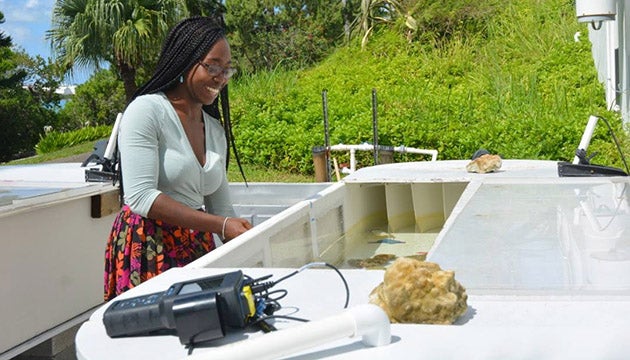A Fruitful Partnership

During the summer of 2018, Moronke Harris, then an undergraduate student at the University of Guelph in Ontario, Canada, completed a research internship at BIOS with support from the Canadian Associates of BIOS (CABIOS). Over the course of three months she worked with BIOS reef ecologist Yvonne Sawall on a project investigating the effectiveness of a geo-engineering process called artificial upwelling in preventing coral bleaching due to rising water temperatures.
In summer 2018, undergraduate student Moronke Harris came to BIOS from the University of Guelph in Ontario, Canada to pursue what had been a years-long ambition: oceanographic research. Through a Canadian Associates of BIOS (CABIOS) internship, she spent three months engaged in a geo-engineering project seeking potential solutions for coral reef bleaching.
“She came to us eager to learn and gain hands-on experience, meticulous about note taking, demonstrating excellence in reporting updates, and keen on following up and learning the process of conducting a science investigation,” said coral reef ecologist and assistant scientist Yvonne Sawall of selecting Harris as a student for mentorship.
Harris, now 25 and entering a master’s of science program in oceanography this fall in British Columbia, remains in close touch with Sawall. They most recently collaborated on a poster about the project results that Harris presented—supported by coaching from Sawall—at the 2020 Ocean Sciences Meeting in San Diego, California.
How did you become interested in oceanography?
Harris: Observation of the largely unexplored ocean offers opportunity for revolutionary discoveries and scientific advances. I have been enthralled by this concept since I was young. As I grew, so did my interests. By the time I was in my undergraduate program at the University of Guelph, I knew oceanography was a field I wanted to explore. Unfortunately for Canadian undergraduate students interested in the research field of marine science, opportunities are few and far between, especially for students like me with no contacts in the field. Those opportunities decrease further when students originate from a land-locked province. Regardless, becoming a marine biogeochemist is the only career I feel passionate about, and I am determined to make it happen.
How did you find BIOS?
I was working as a research assistant for Elizabeth Boulding at the University of Guelph. In 2018 she forwarded me an ad for CABIOS internships and encouraged me to apply. As an avid community volunteer, I was particularly drawn to BIOS because of the organization’s interest in combining the traditional pursuit of knowledge with a dedication to community outreach and educational programs.
I knew an internship at BIOS would assist greatly in continuing my educational career, and provide the tools and experience that would produce a transition into a future professional career in marine science. I applied and was fortunate to gain a position.
During your internship you studied coral bleaching, a reaction of corals to warmer waters, or thermal stress. This is a concern associated with corals as water temperatures rise globally. Would you provide details on your project?
In collaboration with Yuming Feng at the GEOMAR Helmholtz Centre for Ocean Research in Kiel, Germany, I was involved in the implementation, execution, and finalization of a coral bleaching mitigation experiment. Coral bleaching, caused by ocean warming, is one of the most severe threats to tropical coral reefs globally. Artificial upwelling (AU) is a geoengineering technology that drives the flow of deeper water toward the ocean surface. Originally designed to increase productivity of surface waters, caused by upwelling of nutrient-rich deep water, it may also be used to decrease sea-surface temperatures given that deep water is cooler than surface waters. The potential of using AU to prevent coral bleaching remains to be investigated.
Our experiment assessed the efficiency of AU in preventing coral bleaching under thermal stress. The results of this introductory experiment contributed to determining the practicality of using AU during heat stress events in tropical coral reefs. By investigating direct solutions for the reversal and prevention of bleaching threats, this study promotes new initiatives and strategies for reef management.
How do you and your mentor continue to correspond and collaborate?
Sawall has wholeheartedly supported every initiative I have undertaken since my internship at BIOS by providing multiple reference letters and welcoming career updates through email. She encouraged me to apply to present a poster at the 14th International Coral Reef Symposium in Bremen (now scheduled to take place in summer 2021). Sawall also included me as a second author on the paper we currently have under review and, along with our other co-authors, we have worked on editing and addressing reviewer comments. She included me in every step of the submission and review process, which has been helpful for allowing me to gain first-hand experience with submitting papers to peer-reviewed scientific journals. It goes without saying that I would not be where I am without her support.
What are your current and future plans?
The opportunity at BIOS solidified my interest in oceanography. It led to further internships, graduate school offers, scientific newsletter publications, conference presentations, and even (most likely) my first journal article publication. I am currently working as an assistant coordinator with the International Year of the Salmon for the North Pacific Anadromous Fish Commission in British Columbia. I have also been accepted for two summer internships with the Ocean Exploration Trust aboard the Exploration Vessel Nautilus off the coast of Washington state and at the Monterey Bay Aquarium Research Institute in California. In September of this year I will be entering a graduate-level oceanography program and I am currently considering offers from laboratories at both the University of British Columbia and the University of Victoria in British Columbia.
